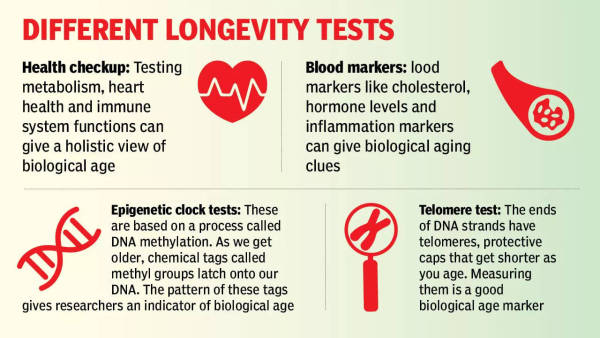
Keeping up with the Kardashians has been quite a task, what with the first family of reality TV setting newer fashion, beauty and lifestyle trends almost every year. Who would have thought they would set health goals too? In July 2024, they took a biological age test during an episode of reality series ‘The Kardashians’ that yielded surprising results. Kim, 43, showed a biological age of 35, while 40-year-old sister Khloe had a cellular age of 28, much to Kim’s chagrin.
But first, what is a biological age test? Well, it has nothing to do with the one on your birth certificate. In layman terms, it’s a test to find out how old the cells of your body are. Dr Andrea Britta Maier, co-director of the Centre for Healthy Longevity at the National University of Singapore, told The New York Times that biological age was “the accumulation of damage we can measure in our body”. This is different from chronological age, which is the number of years we have lived on this earth.
The test that the Kardashian family took is called the Horvath test, named after Professor Steve Horvath, who devised an epigenetic ‘clock’ to measure one’s biological age in 2013. It is still thought of as the gold standard for determining biological age.
There are other longevity-based companies offering biological age tests as well, though they come with hefty price tags. Using epigenetic markers, these tests measure the impact of lifestyle, environment and behaviour on aging. This can help people adjust their diet, exercise, social interactions and sleep.
Not just celebrities, these tests are finding favour with regular people keen to optimise their health as well. Indians like Rakesh Somani, co-founder of longevity research company Decode Age, also go for periodic biological age tests, calling them “the most sophisticated tools developed to understand the biological ageing process.”
While the epigenetic age test is the most sophisticated and considered the most accurate, there are all kinds of biological age tests. Somani’s favourite is the peripheral blood marker test.
“This is quite simple. It’s just my regular annual blood check of about 70 markers, which are then run through an algorithm to predict my biological age in reference to my chronological age. I find this extremely useful as it tells me which of my blood markers contribute to my accelerated ageing and is actionable to the T,” he says.

There are also transcriptomic clocks (machine learning algorithms that use gene expression data to determine biological age) and lipid clocks, but Somani says these are yet to make it to the market. “But eventually, these are going to be everyday tools. We are working towards something like this using microbiome data, and there will be more based on biomarkers as well. Their fate and timeline in the market though will be decided by how robust, reliable and reproducible they are,” he adds.
However, experts say epigenetic clock s have been designed to assess large groups of people, not individuals. So, the results might not be that reliable. Daniel Belsky, associate professor of epidemiology at Columbia University who developed an epigenetic clock himself, tells NYT, “I think you could say the best of them are not completely useless. But these are not tried and tested clinical tools yet, so they’re more for the curious.”
It’s all part of the craze to live longer and healthier. Longevity guru and former Silicon Valley executive Bryan Johnson, who is now the subject of a Netflix documentary, says he has reversed his biological age by 5.1 years after two years of ‘Blueprint’, the name of his health initiative. During the course of the documentary, his pace of aging dropped from 0.69 to 0.64, meaning that for every year that goes by, he’ll age only by about two-thirds of that year.
But before you rush to get yourself a biological age test, consider this. Since there are no established guidelines, it is tough to tell how accurate the test is. Also, researchers say it still won’t tell you how long you’ll live.
TNN & NYT NEWS SERVICE

